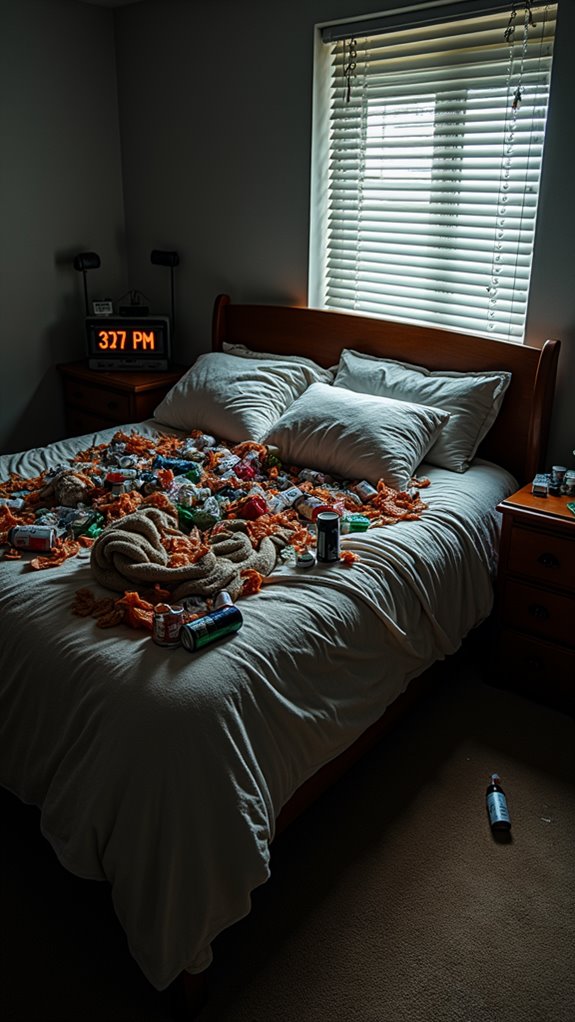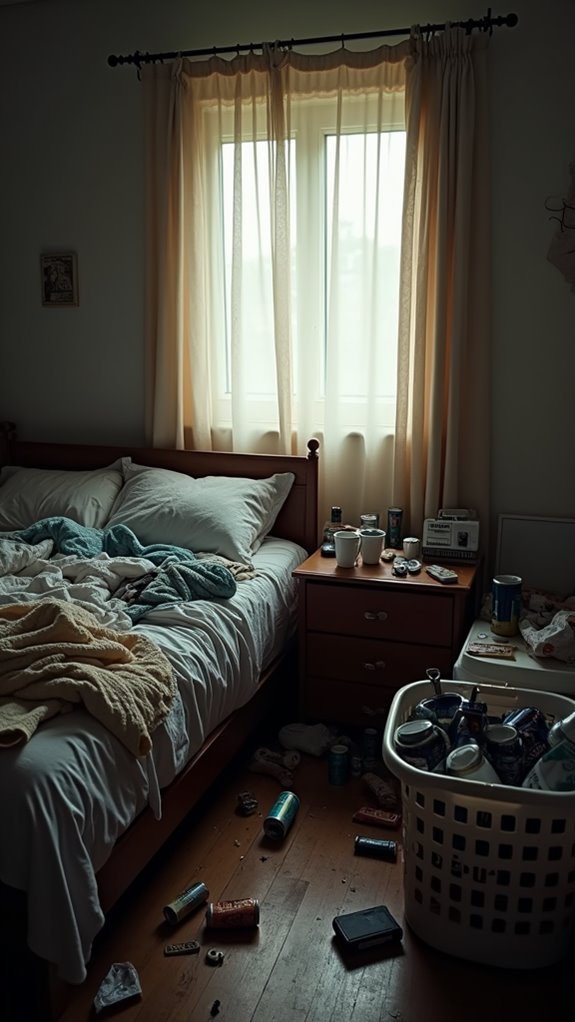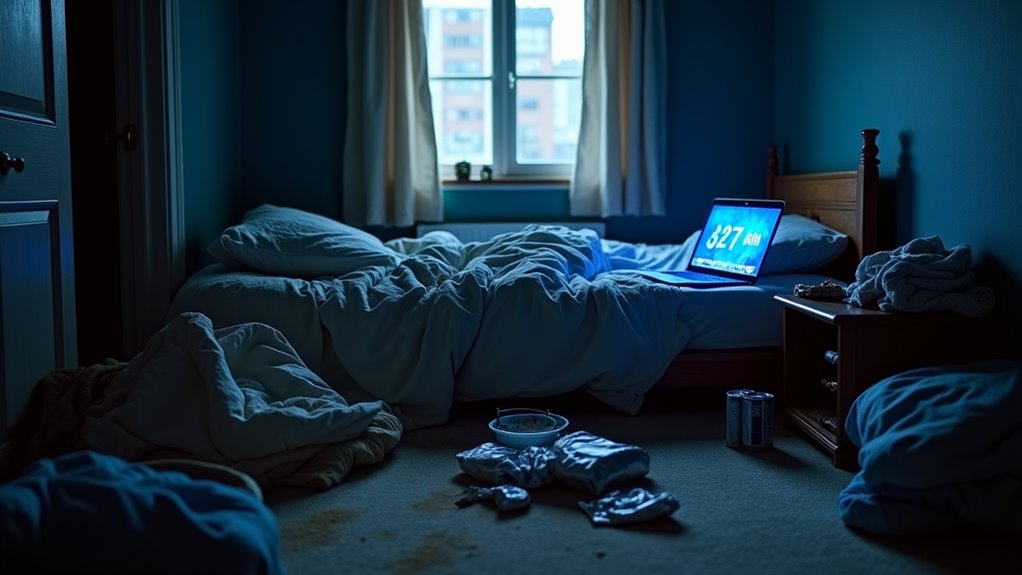Poor self-care sneaks up on you in ways you might not expect – think unwashed dishes piling up, skipped meals replaced by vending machine snacks, and that third night of scrolling through your phone until 2 AM. You’ll notice your favorite jeans getting tighter while your social calendar gets emptier. Maybe you’re hitting the wine bottle more often to unwind, avoiding friends’ texts, or finding yourself too tired to shower. Your body and mind will wave red flags through irritability, exhaustion, and that nagging feeling that something’s off. Don’t worry though – recognizing these signs is your first step toward turning things around.
Table of Contents
Key Takeaways
- Neglecting basic hygiene routines and physical health needs while increasing reliance on substances like alcohol for stress management.
- Experiencing persistent negative self-talk, decreased motivation, and loss of interest in previously enjoyable activities.
- Withdrawing from social connections, avoiding gatherings, and leaving messages unanswered for extended periods.
- Disrupting healthy eating patterns by skipping meals or relying heavily on processed foods and sugary snacks.
- Developing irregular sleep patterns and engaging in mindless behaviors like excessive phone scrolling instead of restful activities.
Physical Signs of Neglect
Even more concerning is when you start reaching for that extra glass of wine or cigarette to cope with stress.
These health concerns aren’t just temporary inconveniences – they’re your body’s way of telling you it’s time to press the reset button on your self-care routine.
Emotional Warning Signals
While physical symptoms highlight the visible toll of poor self-care, your emotional state serves as an equally powerful indicator that something’s off balance. You might find yourself stuck in a cycle of negative self-talk, constantly whispering “I’m not good enough” or “Why bother?” – like having a tiny pessimistic parrot on your shoulder that won’t zip it.
If you’re struggling with mental health, you’ll notice your motivation tank running on empty. Those simple self-care tasks you used to breeze through? Now they feel like climbing Mount Everest in flip-flops.
Your emotional well-being takes a hit when feelings of hopelessness and anxiety become unwelcome houseguests who’ve overstayed their welcome.
When you’re not taking care of yourself properly, even your favorite activities lose their sparkle – like a formerly exciting bubble bath becoming just another chore. You might snap at loved ones more often or feel too exhausted to focus on work.
Destructive Behavioral Patterns

Many destructive behavioral patterns emerge when self-care takes a nosedive. You might find yourself reaching for that extra glass of wine more often than usual, or hitting the drive-thru instead of eating well at home.
These behaviors might feel like they’re helping in the moment, but they’re actually making things worse for your health in the long run.
When you’re not taking good care of yourself, you’ll likely notice these red flags:
- You’re spending more time with unhealthy habits (like excessive drinking) and less time doing things that actually help you feel better.
- Your eating patterns have gone haywire – maybe you’re skipping meals or living on junk food.
- You’ve stopped doing the fun stuff that used to bring you joy, like hanging out with friends or pursuing your hobbies.
Let’s be honest – we’ve all been there, mindlessly scrolling through our phones at 2 AM instead of getting proper sleep.
But when these patterns become your new normal, it’s time to pause and recognize that your feelings matter. If you’re engaging in risky behaviors or self-harm, please reach out for help – you don’t have to figure this out alone.
Social Withdrawal Indicators
During periods of poor self-care, one of the first warning signs shows up in your social life. You might notice yourself making excuses not to spend time with friends, dodging family gatherings, or letting those group chat messages pile up unopened. It’s like your social battery is permanently stuck at zero!
Social withdrawal isn’t just about missing a few coffee dates – it’s a pattern that can seriously impact how you take care of yourself. When you’re not connecting with others, you’re missing out on the support systems that help us maintain healthy self-care habits. Those feelings of loneliness and anxiety can snowball, making it even harder to reach out when you need it most.
Think about how your self-care look has changed. Are you declining invitations you’d normally jump at? Have your friends started asking if you’re okay because they haven’t seen you in weeks?
These are red flags that you might need to take better care of yourself. Remember, humans are social creatures – even introverts need meaningful connections! Recognizing these withdrawal patterns early can help you get back on track before they become deeply rooted habits.
Daily Routine Breakdown

Just as social withdrawal signals declining self-care, your daily routine can paint a clear depiction of how well you’re taking care of yourself.
When you’re not making time for self-care, your daily habits start to slip, and before you know it, you’re living in what feels like survival mode rather than truly taking care of your physical and emotional needs.
Take a look at these telltale signs that your daily routine needs attention:
- You’re skipping basic hygiene tasks like showering or brushing teeth, telling yourself you’ll “do it later” (but later never comes).
- Your meals consist of whatever’s quickest – usually processed foods or sugary snacks – and you can’t remember the last time you drank plain water.
- You’re not getting enough sleep, tossing and turning at night, then dragging yourself through the day feeling like a zombie.
Sound familiar? Don’t worry – you’re not alone.
When life gets hectic, it’s easy to let these habits slide. The good news is that recognizing these patterns is the first step to making positive changes in how you take care of yourself.
Share On X
Conclusion
Studies show that 72% of people struggle with at least one form of self-neglect, so you’re not alone if you’ve spotted these warning signs in yourself. Whether it’s skipping meals, dodging friends, or wearing that shirt with the mystery stain for the third day in a row, poor self-care can sneak up on you. But now that you know what to look for, you’re better equipped to take those first steps toward healthier habits.
Join our list
Subscribe to our mailing list and get interesting stuff and updates to your email inbox.

